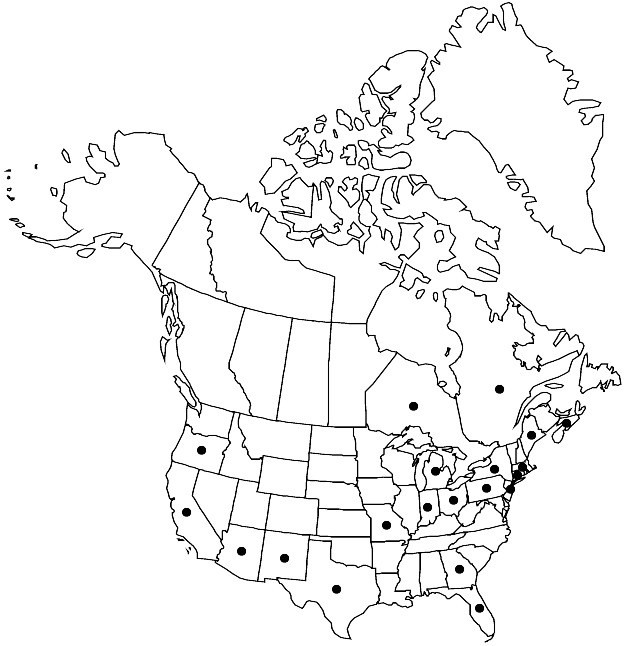Difference between revisions of "Diplotaxis tenuifolia"
Syst. Nat. 2: 632. 1821.
FNA>Volume Importer |
FNA>Volume Importer |
||
| Line 27: | Line 27: | ||
|elevation=0-2100 m | |elevation=0-2100 m | ||
|distribution=N.S.;Ont.;Que.;Ariz.;Calif.;Conn.;Fla.;Ga.;Ind.;Maine;Mass.;Mich.;Mo.;N.J.;N.Mex.;N.Y.;Ohio;Oreg.;Pa.;Tex.;Eurasia;Africa;introduced also in South America (Argentina);Australia. | |distribution=N.S.;Ont.;Que.;Ariz.;Calif.;Conn.;Fla.;Ga.;Ind.;Maine;Mass.;Mich.;Mo.;N.J.;N.Mex.;N.Y.;Ohio;Oreg.;Pa.;Tex.;Eurasia;Africa;introduced also in South America (Argentina);Australia. | ||
| − | |discussion=<p>Diplotaxis tenuifolia was introduced from Europe as a ballast plant in the last century. It may have failed to persist in some of the recorded provinces and states.</p> | + | |discussion=<p><i>Diplotaxis tenuifolia</i> was introduced from Europe as a ballast plant in the last century. It may have failed to persist in some of the recorded provinces and states.</p> |
|tables= | |tables= | ||
|references= | |references= | ||
| Line 52: | Line 52: | ||
|publication year=1821 | |publication year=1821 | ||
|special status= | |special status= | ||
| − | |source xml=https://jpend@bitbucket.org/aafc-mbb/fna-data-curation.git/src/ | + | |source xml=https://jpend@bitbucket.org/aafc-mbb/fna-data-curation.git/src/8f726806613d60c220dc4493de13607dd3150896/coarse_grained_fna_xml/V7/V7_649.xml |
|tribe=Brassicaceae tribe Brassiceae | |tribe=Brassicaceae tribe Brassiceae | ||
|genus=Diplotaxis | |genus=Diplotaxis | ||
Revision as of 17:58, 18 September 2019
Perennials, (usually suffrutescent, roots with shoots from adventitious buds), strongly scented (with glucosinolates), (glaucescent). Stems erect, 2–7(–10) dm, glabrescent or sparsely pubescent basally. Basal leaves: blade elliptic to obovate, 2–15 cm × 10–60(–80) mm, margins sinuate to deeply pinnatifid, (2–5 lobes each side). Cauline leaves petiolate; similar to basal, (distal cauline shortly petiolate, blade similar, with narrower segments), surfaces usually glabrescent. Fruiting pedicels 8–35 mm. Flowers: sepals 4–6 mm, glabrous or pubescent, trichomes straight; petals yellow, 7–11(–13) × 5–8 mm, (apex rounded); filaments 4–8 mm; anthers 2.5–3 mm; gynophore 0.5–3 mm. Fruits usually erect, rarely ascending, (somewhat torulose, slightly compressed), 2–5 cm × 1.5–2.5 mm; terminal segment (stout), beaklike, 1.5–3 mm, seedless; (ovules 20–32(–46) per ovary). Seeds 1–1.3 × 0.6–0.9 mm. 2n = 22.
Phenology: Flowering spring–fall.
Habitat: Waste places, disturbed areas, wharf and railroad ballast, sandy beaches, muddy shores, wet woods, mountain slopes
Elevation: 0-2100 m
Distribution

N.S., Ont., Que., Ariz., Calif., Conn., Fla., Ga., Ind., Maine, Mass., Mich., Mo., N.J., N.Mex., N.Y., Ohio, Oreg., Pa., Tex., Eurasia, Africa, introduced also in South America (Argentina), Australia.
Discussion
Diplotaxis tenuifolia was introduced from Europe as a ballast plant in the last century. It may have failed to persist in some of the recorded provinces and states.
Selected References
None.